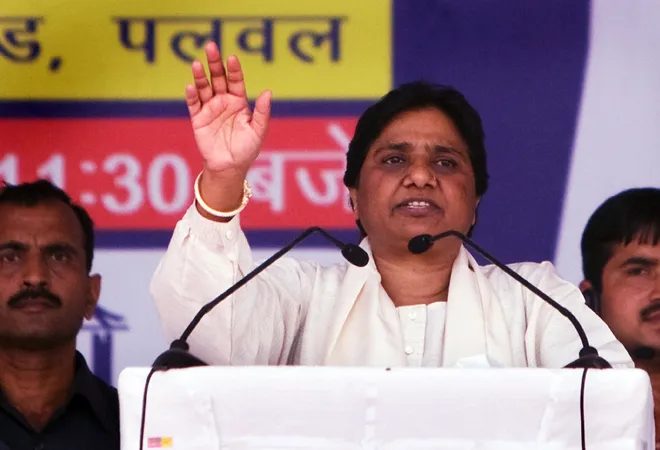
Four times chief minister of one of country’s biggest state and once touted as future first Dalit prime minister, Mayawati’s political future seems to hang in balance despite winning 10 Lok Sabha seats-highest after the tally of 62 of the BJP.
Mayawati, known for her skills to forge electoral alliances to her advantage and abandoning her alliance partners after using them to further the electoral interests of the Bahujan Samaj Party (BSP) that she has been leading since 2001, terminated the alliance with the Samajwadi Party (SP) almost immediately after the Lok Sabha results were announced, accusing her partner Akhilesh Yadav of his inability to transfer Yadav votes to the alliance.
Though, her claim of Yadav votes not going to the BSP candidates in the recently held parliamentary elections does not stand, a close scrutiny of the electoral results reveals Dalit voters too going away from the Mahagathbandhan (SP-BSP-RLD alliance). The reasons for her desertion of former state chief minster Akhilesh Yadav’s party seem to be entirely different.
Ending the BSP’s past tradition of not contesting by-polls, Mayawati’s decision of contesting all 11 assembly by-elections that have been necessitated by victories of sitting MLAs to the Lok Sabha needs to be seen in the the perspective of the changed ground of political realities in which she needs to mend fences with the BJP.
There is a need for her to recalibrate her equations with the ruling party both at the center as well as in UP as her nature of approach to politics is both commercial and transactional. The commercial dimension of Mayawati’s politics results in several kind of traps that is subject to exploitation which in turn forces her to change courses.
One direct consequence of the decision to contest all assembly by-elections is that the electoral fight would be four-cornered. UP Chief Minister Yogi Adityanath and Prime Minister Narendra Modi would not like to send a message that the Lok Sabha win was either managed through manipulation or the popularity of the party and that their leadership in the state is on a receding track.
There is a need for her to recalibrate her equations with the ruling party both at the center as well as in UP as her nature of approach to politics is both commercial and transactional.
While the SP is the latest victim of Mayawati’s cunningly crafted political strategy that finally results in rich political dividends to the BSP, all other political parties in the state that includes two national parties too, have met the same fate whenever they have entered into a kind of understanding or alliance with Mayawati.
It began with Mulayam Singh Yadav in 1995 when his pre-poll ally Mayawati deserted him to become the Chief Minister with the support of the BJP. In 1996, it was the turn of the Congress that contested 1996 assembly election in alliance with the BSP yet Mayawati went on to become the chief minister of the state with the support of the BJP. In 2002, she again became the chief minister with the support of the BJP.
In 1995, 1997 and 2002, she rode to power riding the BJP horse. In the process the saffron party lost its credibility that resulted in the shrinking of its political base. The BJP, after living in political wilderness for over a decade, regained the political ground in 2014 riding the Modi wave and the electoral management of Amit Shah. The two factors catapulted the BJP to power with an overwhelming majority in 2017 assembly elections laying the foundation of hardcore Hinduatva politics in the state with the saffron clad Yogi Adityanath leading from the front as the chief minister of the state.
While her sharp turns and twists resulted in her political success and advancement in the past primarily because her fortress of Dalit voters was impregnable, this time the outcome may not be the same as in the past. Even her own Jatav voter is slipping away from the BSP’s fold as had been the case with the non-Jatav Dalit vote bank in the past few years which has already moved away from her.
A Lokniti-CSDS (Centre for Study of Developing Societies) post-poll survey in UP points out to the erosion of the core vote banks of both the SP and the BSP.
In the Lok Sabha polls, as many as 75% of the Jatavs voted for the SP-BSPRLD alliance, but only 42% of non-Jatav Dalits voted for them. As many as 48% of non-Jatav Dalit voters opted for the BJP candidates.
Declining hold on her core vote bank, failure to draw other castes and sub-castes, deep distrust of Muslim voters, imperious approach and her brand of opportunistic politics is not going to be successful anymore unless she radically changes her image.
There has been a steady decline in the BSP’s vote-shares in the assembly elections. It got 30.43% of the total votes in 2007 when she won absolute majority crated through the support of Brahmins, Muslims, OBCs and Dalits. In 2012, votes share declined to 25.95% which further came down to 22.23% in 2017. Despite the alliance with SP and RLD in 2019, the BSP could manage 19.26% votes in UP which is 0.51% less than its 2014 vote-share.
Declining hold on her core vote bank, failure to draw other castes and sub-castes, deep distrust of Muslim voters, imperious approach and her brand of opportunistic politics is not going to be successful anymore unless she radically changes her image. Till then her marginalization from the politics of “marginalized” is going to continue.
The czarina of Dalit politics, who was till recently wooed by every political party in the country particularly in north India, stands at a crucial crossroad today. Coming weeks and months would show whether she can reinvent herself or not?
The views expressed above belong to the author(s). ORF research and analyses now available on Telegram! Click here to access our curated content — blogs, longforms and interviews.



 Four times chief minister of one of country’s biggest state and once touted as future first Dalit prime minister, Mayawati’s political future seems to hang in balance despite winning 10 Lok Sabha seats-highest after the tally of 62 of the BJP.
Mayawati, known for her skills to forge electoral alliances to her advantage and abandoning her alliance partners after using them to further the electoral interests of the Bahujan Samaj Party (BSP) that she has been leading since 2001, terminated the alliance with the Samajwadi Party (SP) almost immediately after the Lok Sabha results were announced, accusing her partner Akhilesh Yadav of his inability to transfer Yadav votes to the alliance.
Though, her claim of Yadav votes not going to the BSP candidates in the recently held parliamentary elections does not stand, a close scrutiny of the electoral results reveals Dalit voters too going away from the Mahagathbandhan (SP-BSP-RLD alliance). The reasons for her desertion of former state chief minster Akhilesh Yadav’s party seem to be entirely different.
Ending the BSP’s past tradition of not contesting by-polls, Mayawati’s decision of contesting all 11 assembly by-elections that have been necessitated by victories of sitting MLAs to the Lok Sabha needs to be seen in the the perspective of the changed ground of political realities in which she needs to mend fences with the BJP.
There is a need for her to recalibrate her equations with the ruling party both at the center as well as in UP as her nature of approach to politics is both commercial and transactional. The commercial dimension of Mayawati’s politics results in several kind of traps that is subject to exploitation which in turn forces her to change courses.
One direct consequence of the decision to contest all assembly by-elections is that the electoral fight would be four-cornered. UP Chief Minister Yogi Adityanath and Prime Minister Narendra Modi would not like to send a message that the Lok Sabha win was either managed through manipulation or the popularity of the party and that their leadership in the state is on a receding track.
Four times chief minister of one of country’s biggest state and once touted as future first Dalit prime minister, Mayawati’s political future seems to hang in balance despite winning 10 Lok Sabha seats-highest after the tally of 62 of the BJP.
Mayawati, known for her skills to forge electoral alliances to her advantage and abandoning her alliance partners after using them to further the electoral interests of the Bahujan Samaj Party (BSP) that she has been leading since 2001, terminated the alliance with the Samajwadi Party (SP) almost immediately after the Lok Sabha results were announced, accusing her partner Akhilesh Yadav of his inability to transfer Yadav votes to the alliance.
Though, her claim of Yadav votes not going to the BSP candidates in the recently held parliamentary elections does not stand, a close scrutiny of the electoral results reveals Dalit voters too going away from the Mahagathbandhan (SP-BSP-RLD alliance). The reasons for her desertion of former state chief minster Akhilesh Yadav’s party seem to be entirely different.
Ending the BSP’s past tradition of not contesting by-polls, Mayawati’s decision of contesting all 11 assembly by-elections that have been necessitated by victories of sitting MLAs to the Lok Sabha needs to be seen in the the perspective of the changed ground of political realities in which she needs to mend fences with the BJP.
There is a need for her to recalibrate her equations with the ruling party both at the center as well as in UP as her nature of approach to politics is both commercial and transactional. The commercial dimension of Mayawati’s politics results in several kind of traps that is subject to exploitation which in turn forces her to change courses.
One direct consequence of the decision to contest all assembly by-elections is that the electoral fight would be four-cornered. UP Chief Minister Yogi Adityanath and Prime Minister Narendra Modi would not like to send a message that the Lok Sabha win was either managed through manipulation or the popularity of the party and that their leadership in the state is on a receding track.
 PREV
PREV


